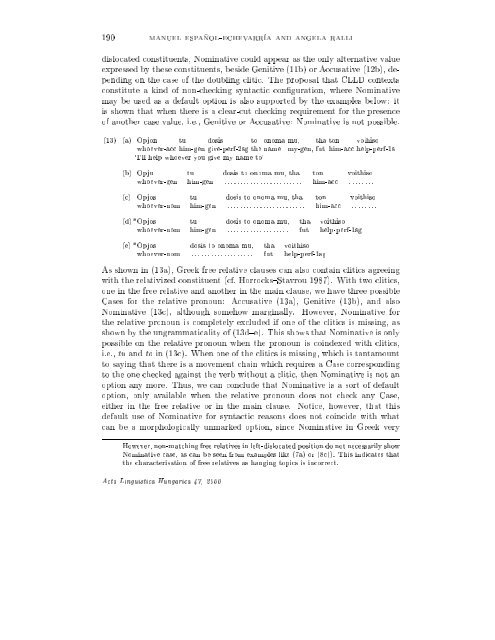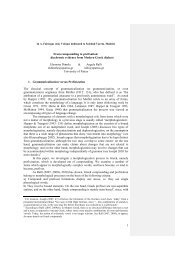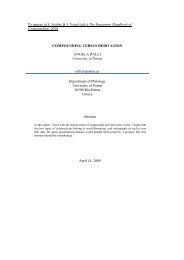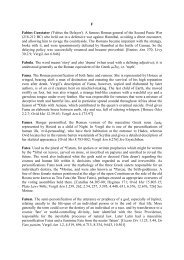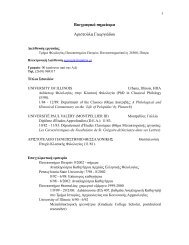Case mismatches in Greek: Evidence for the autonomy of morphology
Case mismatches in Greek: Evidence for the autonomy of morphology
Case mismatches in Greek: Evidence for the autonomy of morphology
You also want an ePaper? Increase the reach of your titles
YUMPU automatically turns print PDFs into web optimized ePapers that Google loves.
190 manuel espaol-echevarra and angela ralli<br />
dislocated constituents, Nom<strong>in</strong>ative could appear as <strong>the</strong> only alternative value<br />
expressed by <strong>the</strong>se constituents, beside Genitive (11b) or Accusative (12b), depend<strong>in</strong>g<br />
on <strong>the</strong> case <strong>of</strong> <strong>the</strong> doubl<strong>in</strong>g clitic. The proposal that CLLD contexts<br />
constitute a k<strong>in</strong>d <strong>of</strong> non-check<strong>in</strong>g syntactic conguration, where Nom<strong>in</strong>ative<br />
may be used as a default option is also supported by <strong>the</strong> examples below: it<br />
is shown that when <strong>the</strong>re is a clear-cut check<strong>in</strong>g requirement <strong>for</strong> <strong>the</strong> presence<br />
<strong>of</strong> ano<strong>the</strong>r case value, i.e., Genitive orAccusative: Nom<strong>in</strong>ative is not possible.<br />
(13) (a) Opjon tu dosis to onoma mu, tha ton voihiso<br />
whoever-acc him-gen give-perf-2sg <strong>the</strong> name my-gen, fut him-acc help-perf-1s<br />
`I'll help whoever you give my name to'<br />
(b) Opju tu dosis to onoma mu, tha ton voithiso<br />
whoever-gen him-gen ........................ him-acc ........<br />
(c) Opjos tu dosis to onoma mu, tha ton voithiso<br />
whoever-nom him-gen ........................ him-acc ........<br />
(d) *Opjos tu dosis to onoma mu, tha voithiso<br />
whoever-nom him-gen ................... fut help-perf-1sg<br />
(e) *Opjos dosis to onoma mu, tha voithiso<br />
whoever-nom ................... fut help-perf-1sg<br />
As shown <strong>in</strong> (13a), <strong>Greek</strong> free relative clauses can also conta<strong>in</strong> clitics agree<strong>in</strong>g<br />
with <strong>the</strong> relativized constituent (cf. HorrocksStavrou 1987). With two clitics,<br />
one <strong>in</strong> <strong>the</strong> free relative and ano<strong>the</strong>r <strong>in</strong> <strong>the</strong> ma<strong>in</strong> clause, we have three possible<br />
<strong>Case</strong>s <strong>for</strong> <strong>the</strong> relative pronoun: Accusative (13a), Genitive (13b), and also<br />
Nom<strong>in</strong>ative (13c), although somehow marg<strong>in</strong>ally. However, Nom<strong>in</strong>ative <strong>for</strong><br />
<strong>the</strong> relative pronoun is completely excluded if one <strong>of</strong> <strong>the</strong> clitics is miss<strong>in</strong>g, as<br />
shown by <strong>the</strong> ungrammaticality <strong>of</strong> (13de). This shows that Nom<strong>in</strong>ative is only<br />
possible on <strong>the</strong> relative pronoun when <strong>the</strong> pronoun is co<strong>in</strong>dexed with clitics,<br />
i.e., tu and to <strong>in</strong> (13c). When one <strong>of</strong> <strong>the</strong> clitics is miss<strong>in</strong>g, which istantamount<br />
to say<strong>in</strong>g that <strong>the</strong>re is a movement cha<strong>in</strong> which requires a <strong>Case</strong> correspond<strong>in</strong>g<br />
to <strong>the</strong> one checked aga<strong>in</strong>st <strong>the</strong> verb without a clitic, <strong>the</strong>n Nom<strong>in</strong>ative isnotan<br />
option any more. Thus, we can conclude that Nom<strong>in</strong>ative is a sort <strong>of</strong> default<br />
option, only available when <strong>the</strong> relative pronoun does not check any <strong>Case</strong>,<br />
ei<strong>the</strong>r <strong>in</strong> <strong>the</strong> free relative or <strong>in</strong> <strong>the</strong> ma<strong>in</strong> clause. Notice, however, that this<br />
default use <strong>of</strong> Nom<strong>in</strong>ative <strong>for</strong> syntactic reasons does not co<strong>in</strong>cide with what<br />
can be a morphologically unmarked option, s<strong>in</strong>ce Nom<strong>in</strong>ative <strong>in</strong> <strong>Greek</strong> very<br />
However, non-match<strong>in</strong>g free relatives <strong>in</strong> left-dislocated position do not necessarily show<br />
Nom<strong>in</strong>ative case, as can be seen from examples like (7a) or (8c)). This <strong>in</strong>dicates that<br />
<strong>the</strong> characterisation <strong>of</strong> free relatives as hang<strong>in</strong>g topics is <strong>in</strong>correct.<br />
Acta L<strong>in</strong>guistica Hungarica 47, 2000


